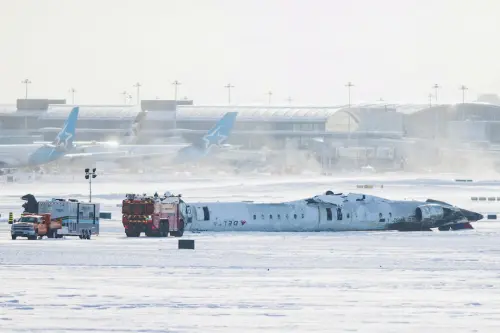Canadian investigators announced on Tuesday that they have sent the black boxes from a Delta Air Lines regional jet, which flipped upside down during landing in Toronto, for further analysis as they investigate the crash that resulted in injuries to 21 people.
After the initial impact on the runway at Toronto's Pearson Airport, sections of the CRJ900 aircraft separated, leading to a subsequent fire, according to Transportation Safety Board of Canada Senior Investigator Ken Webster.
A team of over 20 Canadian investigators is heading the investigation into the Delta's Endeavor Air-operated jet, receiving support from the U.S. National Transportation Safety Board, Transport Canada, and the U.S. Federal Aviation Administration.
Webster indicated that it was premature to ascertain the reasons behind the incident involving the flight from Minneapolis-St. Paul International Airport.
Experts noted the challenging weather conditions at the time, including a gusting crosswind and blowing snow, reported by the flight tracking website FlightRadar24.
Analysis of the landing revealed a lack of the usual "flare" maneuver, where pilots raise the nose before touchdown to reduce speed, suggesting a firmer than typical landing, as mentioned by U.S. aviation safety expert John Cox.
The 16-year-old CRJ900, built by Canada's Bombardier and powered by GE Aerospace engines, seats up to 90 passengers. Video footage post-accident showed at least one wing detached.
Delta confirmed that most passengers had been discharged from local hospitals following the crash, with the two remaining hospitalized passengers not in critical condition.
Greater Toronto Airports CEO Deborah Flint commended the safety measures that prevented fatalities and praised the response of flight crew and first responders.
A passenger, Peter Koukov, recounted the harrowing experience, where the jet unexpectedly flipped upon landing, but he and a fellow passenger managed to stay composed and safely exit the aircraft.
The Delta flight landed in Toronto at 2:13 p.m. on Monday and will require additional time for the wreckage to be cleared, necessitating runway closures for at least the next 48 hours, according to Flint.
Efforts to normalize flight operations at Toronto Pearson have been impeded by the recent snowstorm, causing Air Canada to cancel numerous flights. Air Canada's Chief Operating Officer Craig Landry anticipates that it may take several more days to fully restore operations due to the weather conditions.
